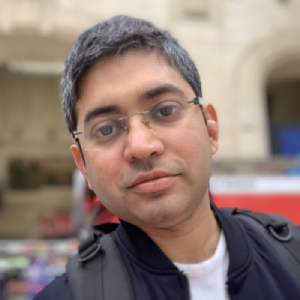
The New Zealand Tech Alliance is a group of independent technology associations from across New Zealand that work together to ensure a strong voice for technology.
Visit Tech Alliance

The New Zealand Tech Alliance is a group of independent technology associations from across New Zealand that work together to ensure a strong voice for technology.
Visit Tech Alliance
This month in our new AI leadership Q&A series we meet executive council member Anshuman Banjeree and discover what inspires him.
Tell us a little bit about yourself?
I grew up in India in the city of Kolkata. My education took me to different parts of the country and I have an undergrad degree in Industrial Engineering and a Masters in Business Administration. I spent quite a bit of my early career working for a startup before moving to Silicon Valley working on technology outcomes across different geographies. Later, I worked in business advisory for a consulting firm before joining Spark a decade ago. As an AI Forum executive council member, my goal is to further the use of AI and technology to create abundance, enhance productivity, and to empower people to create a better and smarter world. Outside of Spark and work, I enjoy spending time with my family, teaching maths to my daughter and also have a Great Walk planned for later this year.
What sparked your interest in AI?
I have always been interested in the next big wave of innovation. About six years ago, I initiated an AI project at Spark to proactively use information to predict outcomes. AI was not a hot area back then and data scientists were relatively unheard of. Launching our first AI model took nine months, it was a challenging and a rewarding experience at the same time. Throughout my career, I’ve been fascinated by how technology improves users and customers’ lives, as well as its broader impact on industry and society. Over time, I have been convinced of AI’s potential to solve problems, as I have been a part of a few such outcomes myself! If we consider our world to be a collection of data points, we will realise that our perception is limited by a very thin slice of data points that we can consume and comprehend. AI is capable of consuming and analysing vast amounts of data, which means that it can be used to solve our most complex problems.
How do you explain the benefits of AI?
Every incremental technology evolution has resulted in certain types of work being handed over to technology, so that humans can move on to more higher value problem solving. Over the last few years, applications of AI were around machine intelligence to identify and understand repeatable patterns, with subsequent automation of tasks. Recent advancements in AI’s ability to understand and generate human language have made it more accessible to everyone. This democratisation of AI means that extracting benefits from AI, which was limited to technology teams solving problems for others, can now be used by anyone who wants to use it to solve problems for themselves or for their organisation. This will result in wider innovation and have an impact at a more significant scale going forward.
How do you harness innovation and creativity?
Every organisation has its unique nuances, so expecting a one-size-fits all solution is unrealistic. This means that there is a need and an opportunity for creativity and innovation in almost everything we do. At Spark, creating an innovation culture is part of the organisation’s core business strategy. In my area, the ability to innovate is almost an expectation and we are actively encouraged to experiment and try out different approaches. As a result, we have developed data products that address long-standing issues within the business. These solutions often have no products in the market at the time. Many of these initiatives may seem like R&D, but are expected to create tangible value and generate commercial outcomes.
What do you enjoy most about your job?
Being in a field that is changing rapidly can be both exciting and chaotic, and on any given day, I am somewhere between the two extremes. What I really enjoy is I have to challenge boundaries and status quo as part of my job. The faith and trust from my leadership team matters significantly in this kind of a role. What also matters is to be surrounded by a set of people who have a shared aspiration to challenge these boundaries and believe that we have the capability to solve some of the most complex problems. My best days at work are when I spend time with my teams, who are working on solving complex problems and being able to add to their thinking and outcome in a positive way.
What tips do you have on problem solving at work?
All businesses inherently have problems, and having an innovative team is key to finding ways to solve these issues and propel the organisation forward. While it is important to understand if solving a particular problem will be commercially beneficial to the organisation in the short or long term, it is also crucial to identify which problems energise us as people and which drain us of that energy. Those problems where there is an alignment between the organisations objectives and my own, are a sweet spot and my aim is always to find that sweet spot. However, I also think that with some amount of creativity, solution approaches can be constructed in a way that can make a piece of work really exciting. I generally prefer working on problems without clear solution guidelines, as this provides a wider space for creativity and innovation for the teams.

Anshuman Banerjee
AI & Engineering
Spark NZ
Keep updated with the AI Forum’s news and events here.
If you’re not already a member, learn more and join us.